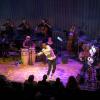
If the SFJAZZ Collective’s collaboration with the de Young Museum is an experiment looking at how to organize the ensemble’s annual commissioning project, Thursday’s concert in Miner Auditorium provided an abundance of data to analyze. At the official premiere on Oct. 24, the first of four performances, the seven-piece Collective introduced new compositions by each of its members, inspired by works from the de Young exhibition About Place: Bay Area Artists From the Svane Gift (which runs through November 2025).
On its own terms, the music was entirely successful. Saxophonist Chris Potter, the Collective’s music director, contributed a meditative but mercurial opener, based on a colorful, abstract canvas by Chris Johanson with the koan-like title Unknow Know With What Is 12. And there was saxophonist David Sánchez’s closer, Listo, which used an assemblage by Mexican artist Guillermo Galindo as the point of departure for a thrilling multipart evocation of the human urge to overcome obstacles while seeking greener pastures.
The collaboration offered an ideal opportunity to put Miner Auditorium’s state-of-the-art video projection system to work. SFJAZZ video technician Robert Bambey projected images of each artwork and then created mobile patterns out of details or fragments from the original. Potter’s piece didn’t feel particularly related to Johanson’s swirling design and calming color scheme, but the video projection matched the energy and wider dynamic range of the performance.

Pianist Edward Simon, the longest-serving member of the Collective, selected the right-hand panel from the triptych New Normal by Oakland artist Rupy C. Tut, composing a piece he called Guardians of the Oceans. With aqueous imagery filling the auditorium’s back wall, Simon’s somber piece surged and ebbed, setting Potter’s sinuous bass clarinet lines underneath Sánchez’s flowing tenor sax and concluding with a delicately luminous duet between Simon’s piano and Warren Wolf’s vibes.
For most of its 21-season history, the Collective has worked as both an engine for new music, commissioning each member to contribute original works written for the group, and a repertory ensemble, with every player arranging a composition by the year’s designated master. (Past seasons focused on the music of artists such as John Coltrane, Thelonious Monk, Herbie Hancock, Antônio Carlos Jobim, and Stevie Wonder.)
This strategy worked well for a long time, attracting an evolving cast of elite musicians while providing a thematic hook for venues presenting a group touring without the benefit of a leader’s name.
Since Potter came on board as the Collective’s first official music director in 2021, the group has gradually moved away from the repertory angle to focus on original material, and the de Young collaboration offers a tantalizing look at future possibilities. (Scores for short films? Settings for text and poetry?)
But Thursday’s performance also exposed problems. While the Collective played with the virtuosity and attention to detail we’ve come to expect, the assignment was difficult for the musicians to get their hands around.
Many of the musicians felt they had to represent the artists they selected and provide some explanation of the artwork, which was generally a losing proposition. Trumpeter Mike Rodriguez’s tune didn’t seem particularly related to Clare Rojas’s Walking in Rainbow Rain, and there was no reason for him to try to explain her intentions. Both works speak eloquently for themselves.
Wolf recited several paragraphs of text over the cinematic funk of My Father’s FBI Files, a piece based on Sadie Barnette’s assemblage FBI Drawings: Legal Ritual. With Simon playing a 1970s Rhodes setting on the keys and the superlative rhythm section tandem of bassist Matt Brewer and drummer Kendrick Scott deep in the pocket, the group leaned into a Curtis Mayfield groove. One hopes that Barnette’s father, the founder of the Compton chapter of the Black Panther Party, was more interesting than Wolf’s self-serving testimony. But the music — relentless, tough, and street-smart — certainly carried its own message.




